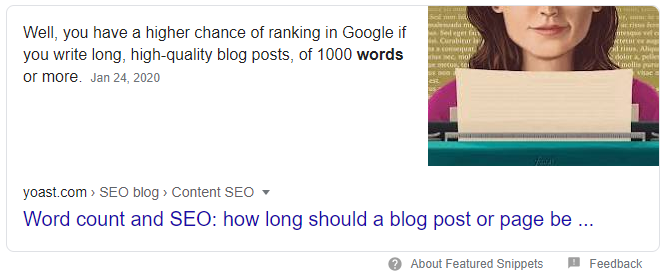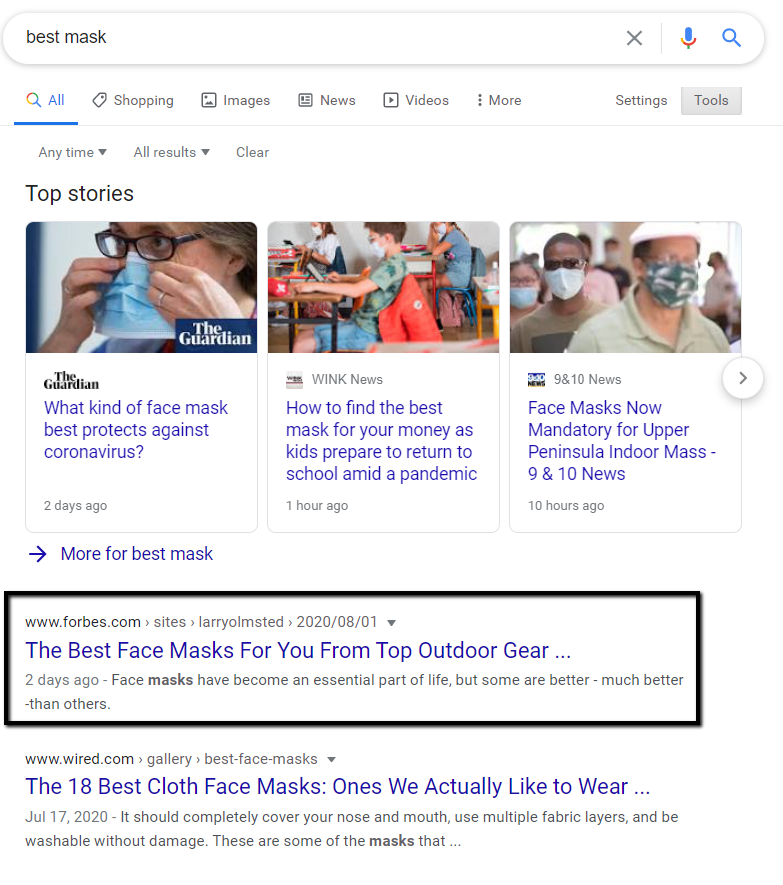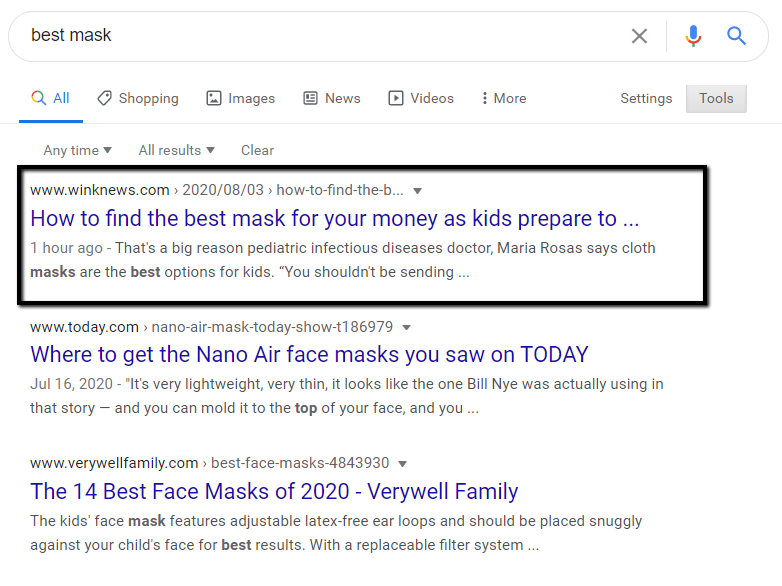For a long time, it has been a matter of discussion about how many words are ideal for a web page in relation to SEO.
There have been many who have tried to investigate and find the answer to it. But it is as if there is no clear answer yet.
Many of the qualified answers that have been to the question of how many words are ideal for ranking high in the search results have suggested that word count actually does not matter. But still, many correlation studies that are put forward actually indicate that there is some correlation between high word count and high rankings.
But is it now also true in an age that offers machine learning? – And is there any difference between different kinds of SEO-related copy like blog posts, landing pages, link building text, product pages, etc. That’s what we want to find out.
Previous findings
A quick Google search also provides a result from Yoast, which suggests that there is a higher chance of rankings in Google if a blog post contains over 1000 words.

But on the page, they also state:
“For regular posts or pages we advise writing more than 300 words. Why is that? Well, a higher word count helps Google to better understand what your text is about. And, generally speaking, Google tends to rank longer articles higher.“
So at least 300 words, they think it takes to rank on Google.
According to Google’s own webmaster trends analyst, John Mueller, he claims a long text does not necessarily provide better rankings.
Having the same word-count as a top-ranking article isn’t going to make your pages rank first, just like having a bunch of USB chargers isn’t going to get you to the moon. But, I’m still tempted to buy some of those USB chargers…https://t.co/TIuJHwHufn
— ? John ? (@JohnMu) February 8, 2020
But if John says that longer text does not give higher rankings, why have these 3 major SEO institutions then found clear correlations that a text that has an average word count of 1.449 ranks better than all other pages?
These 3 SEO institutions have concluded these numbers as being the best word count, for higher rankings:
- Yoast – Word count and SEO: 1.000.
- Search Engine Journal – What’s the ideal blog post length: 1.900.
- Backlinko – We analyzed 11.8 million Google search results: 1.447.
Average word count: 1.449.
Does this mean that you should always strive for a minimum of 1,449 words when you want to write a high-quality blog post or another kind of high-quality resource?
Not necessarily.
But why do these correlation studies then come up with more or less the same conclusion?
A good guess could be that for many years there has been a basic idea that a longer text gave higher rankings, which is why the SEOs responsible for these websites have tended to write long texts.
So the correlations could actually be due to marketers who are specifically trying to improve their websites SEO and thus have also tried to write longer texts with the idea that it could increase the rankings.
In fact, our own studies show something completely different. It will be near impossible to quantify a definitive ideal word count. We will explain and show why in more detail later in the post.
How search engines might process texts
The first thing to notice here is that we address our headings with “might”. Because in the end, only Google knows the answer to how they process texts and whether the word count is something to strive for.
But we will give our qualified bid on how search engines can potentially address text and why word count is a metric you should not pay much attention to.
To understand how search engines and especially Google work, we need to go 10 years back in time.
Here, Matt Cutts explains brilliantly how Google processes the text that is on the web pages. They extract keywords from the pages which they then categorize into various topics, then use many other cues to understand the credibility of the page.
Feel free to watch the video from the good old days when SEO was a little more straightforward:
But what does that have to do with word count?
So, in order for Google to retrieve these keywords, they must somehow use some techniques to find and extract the most important words for the page.
Some of the techniques that Google is believed to have used are TF-IDF or term frequency inverse document frequency, words in the title tag, and words in headings.
So if you want to make sure that Google understands what your page is about, then it was a good idea to write long texts where you made sure to include the most important keywords, the right places and in the right number (If you had too many repeated keywords, it is believed that there was a penalty for keyword stuffing).
With the above techniques, it will make very good sense to try to hit a certain number of words in order for your page to add as much value as possible.
But to better understand why word count today does not mean the same thing as it did ten years ago, we need to fast forward to 2019-2020 and look at the latest algorithmic updates and official statements from Google.
Google in 2022
Anyone who has worked with IT in recent years has probably heard of the term: Mobile First.
But in the last three years, Google has announced a new term we should all familiarize ourselves with: AI First.
It has also meant that Google has given us some new algorithm updates, which can give a hint as to why we should no longer think SEO, as in the old days (TF-IDF, keywords in title, headings, etc..), but instead, think dynamically/contextual and more user-oriented.
The latest major AI update that Google has made is the BERT update.
BERT is basically a machine learning algorithm that, based on large amounts of text, has been trained to be able to look at a piece of text and find the best corresponding matching answer.
But what does that mean for us SEOs?
This means that Google, at almost the same level as a human being, can find the answer to a question. This essentially means that to some extent we can no longer manipulate the search engine with words and the length of the text. So Google understands and processes text in a completely different way than they did ten years ago.
Does this mean that you can write a text of 10 words and rank high in the search results?
Most likely not. Although word count is NOT something you should spend a lot of energy on, you still need to write content that is understandable and that gives a contextual meaning.
The test for “What is the best word count in 2022?”
At Tabtimize, we use several complex machine learning models to analyze and understand the text on a web page.
However, we do not use all the same models as Google or other search engines, but the mechanisms behind the text analysis are more or less the same, which therefore gives us great confidence in the tests we do ourselves.
In order to give an estimate of how many words you must at least write in order for the text analysis to give a result that can rank in the search engines, we will use our own text analysis.
To find out the minimum word count for the text analysis to give a result, we use some fictitious text examples.
Before we start showing the results of the test, we want to highlight that there are several stages and levels in the text analysis, which means that there are several different data types that a text analysis tries to find, which therefore can give different results. Here it is meant that it typically takes far fewer words or context to extract keywords than it takes to extract the overall topic of a text. Therefore, the minimum word count will be based on a full-text analysis, where all stages and levels are met.
In addition, the test results template will also be described:
Inside the text box, the analyzed text is displayed. Just below the text box, word count is displayed.
In the right column, keywords are displayed, which are all the most important words and entities from the text. If there are more than five keywords, only the five most important ones are displayed.

In the Overall topic row (what we call URL topic), the topic for the entire text is displayed. There may well be more than one topic.
The last data type is Content topics, which show the different topics that the individual sentences are about.
The context vs word count test
We start with a very simple test, with the text: “This is a short text of 8 words“.

8 words are unfortunately not enough to cover a topic, but keywords could be extracted.
It must also be said that the text does not really bring any context, but what if we use 8 words in connection with a topic?

Damn you Covid-19!
It seems that providing a little context gives us an overall topic, but it is still not contextual deep enough to provide content topics.
A 16-word text will now be tested, adding a little more context to the short 8-word text.

16 words are supposedly enough for the machine to understand what is being written about. We have been given keywords, two overall topics, and a content topic
However, a small detail that has not been shared yet is that our text analysis actually quantifies the results of the analysis to a numerical value that can be used to assess how credible/confident the machine is that the results are correct. These are some of the same values we also use in our Link Relevance Score.
Unfortunately, it has not been possible to show these values in this test, due to technical challenges, but we have subsequently been able to retrieve the values from the backend.
If the text analysis shows a score of 100, it means that the machine is 100% sure that the results are correct and thus is 100% sure that there is a contextual meaning in the text.
The above 16-word text example got a score of 42, which means that the result is not the best. Therefore, one will most likely not be recommended to link to a page, with this text.
We can probably also quickly agree that a text of 16 words is not exactly realistic for writing a short blog post or at least it’s hard to cover a topic with.
But a text of 80-100 words can easily be a realistic bid for a blog post that describes a topic briefly. Therefore, we must test a text that briefly explains a topic and see if it then gets a higher score.
We then tried a slightly longer text of 85 words from Wikipedia, which describes what machine learning is.

Here the result is much better. The text analysis yielded 16 keywords (Only the 5 most relevant are shown in the example), a very precise overall topic (Computer science with the subcategory, artificial intelligence), and three very specific content topics.
The result of the above analysis gave a score of 85, which is quite reasonable and is a text and score that we could recommend others to link to and get a link from.
Word count and text analysis of page 1 vs page 5
Let’s take a look at an example from the real world and see if there is a difference between pages that rank at the top of results page 1 and at results page 5, of some random search queries.
In the first test, we look at whether a result on the first page gets a higher relevance score than the result on Google’s rank page 5.
We start by searching for the query “best mask”.

The first organic result on the search query is selected, as well as the first organic result on page 5.

The first analysis of the article from Forbes shows a full-text analysis with all data types occupied with results.

The analysis of the Forbes article showed over 20 keywords, two overall topics, and two content topics. Also, the analysis gave a score of 75, which is not the best score, especially if we look at the example above that got a score of 85. We will get into later why such a long text does not score very high in the text analysis.
The second analysis is based on the article from Today and showed a much worse result.

The machine did not manage to find an overall topic for the page, and that the analysis gave a score of 42. But if you take a look at the word count, there is also a big difference in the length of the two pages.
Here it is difficult to directly conclude whether it is the word count or the better context analysis that may be the reason why Forbes ranks far better.
Although if we also look at the number of backlinks per page and the authority metrics of the respective websites (retrieved from ahrefs), Forbes should not be 5 results pages higher up in rankings than Today’s article.


So it is probably not authority that makes the big difference in this example. on the contrary, it tells a completely different story, which we do not get into today.
Another way to ask the question about word count could also be: “what is the minimum word count for SEO?”
The conclusion of the ideal word count for SEO in 2022
It no doubt takes a few words for the search engines to understand what a text is about, but it may not be in as high a word count as first assumed.
With machine learning, Google and search engines better understand your content without having to type thousands of words. As the example with the text of 85 words, it explained briefly and exactly what the topic machine learning is, but it is clear if you want to write content that covers several topics and goes in-depth with several things, then, of course, there must be more than 85 words to do so and the word count can quickly hit a few thousand (just like this post).
However, we have also seen that a long text that is NOT written with the user and context in focus can tend to drift away from the overall topic and score poor scores in the text analysis. Unfortunately, this may be the result of attention to word count instead of context.
The real takeaway from here is that you should write something that gives contextual meaning and something that your users understand and value. That is a conclusion many others have come to as well, but in this post, we have also shown you WHY.
If you just make sure your text got context the search engines should understand what you are trying to tell. Of course, there is much more to SEO and high rankings than word count, which is why it might make better sense to focus your efforts elsewhere than word count.



